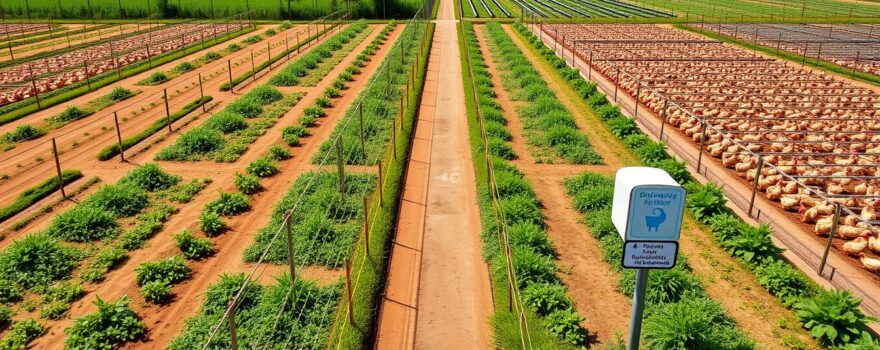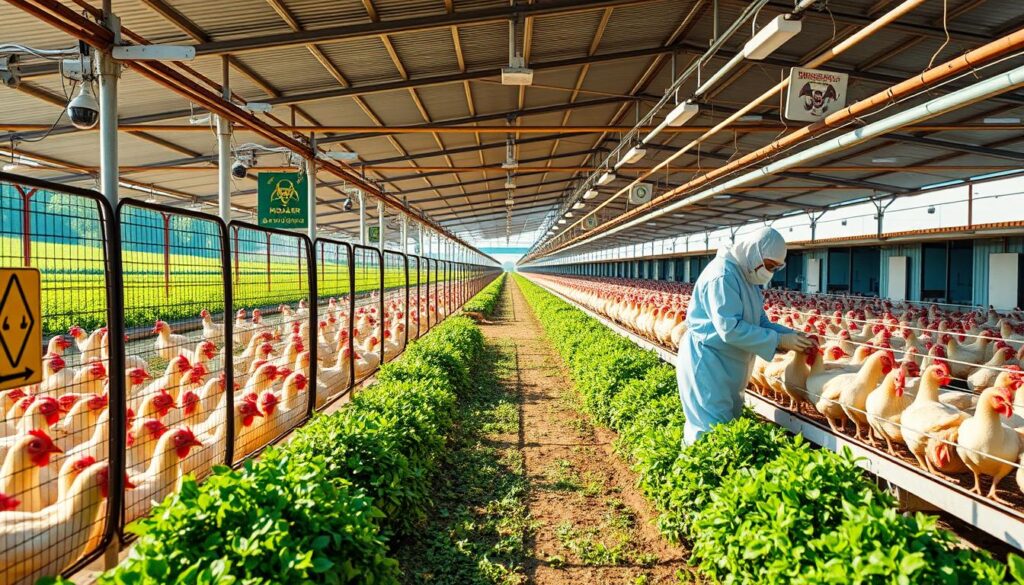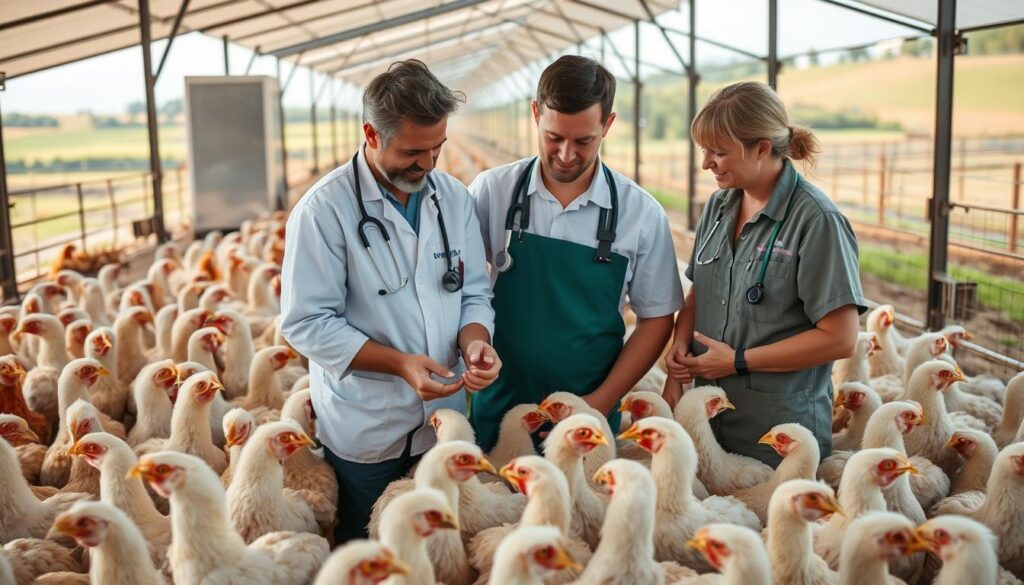
Keeping your broiler flock healthy and productive is key for any poultry farmer. A good way to protect your birds from diseases is to have a solid biosecurity plan. This plan helps lower the risk of disease getting into your farm, keeping your chickens safe and healthy.
A strong biosecurity plan includes many steps to stop diseases from entering your farm. It covers things like controlling who visits, cleaning equipment well, and more. Each part of the plan is important for keeping your farm safe and your chickens healthy.
Key Takeaways
- Develop a comprehensive biosecurity plan to protect your broiler flock from disease outbreaks
- Implement strict visitor management protocols, including visitor logs and disinfection stations
- Maintain optimal farm hygiene and sanitation to create a clean and disease-free environment
- Establish effective equipment and vehicle disinfection measures to prevent the spread of pathogens
- Train and educate your workers on biosecurity best practices to ensure compliance and vigilance
Understanding the Importance of Biosecurity in Broiler Farming
Broiler farming is key to the poultry industry, offering protein to people everywhere. But, disease outbreaks in broiler flocks are a big worry. Diseases like avian influenza and Marek’s disease can hurt the economy and animal welfare, making biosecurity crucial.
Risks and Consequences of Disease Outbreaks
Disease outbreaks in broiler farms can harm the birds and the industry. Diseases spread fast, causing many birds to die and reducing farm productivity. This can lead to big problems for the farm and its owners.
Economic and Animal Welfare Implications
Disease outbreaks can cost farms a lot of money. They can lead to less profit due to fewer eggs and less weight gain. The cost of fighting diseases adds to the financial burden. Also, sick birds suffer, which is a big concern for animal welfare.
Understanding the risks and consequences of disease outbreaks, as well as the economic and animal welfare implications of poultry diseases, shows why biosecurity is so important. By taking action, broiler farmers can protect their flocks. This ensures the farm’s success and the animals’ well-being.
How to Develop a Comprehensive Biosecurity Plan for Your Broiler Farm
Creating a strong biosecurity plan is key for your broiler farm’s health and success. It includes managing visitors, keeping the farm clean, disinfecting equipment and vehicles, and training workers.
To make a detailed biosecurity plan, follow these steps:
- Implement Strict Visitor Management: Set up clear rules for visitors. This includes logging their info and giving them PPE.
- Maintain Exceptional Farm Hygiene: Make sure to clean and disinfect everywhere. This includes the poultry houses and where you store equipment.
- Ensure Effective Equipment and Vehicle Disinfection: Create a schedule for cleaning and disinfecting all farm gear, vehicles, and machines. This stops diseases from spreading.
- Provide Comprehensive Worker Training: Teach your team about biosecurity. Explain their roles and the steps to keep the farm disease-free.
By carefully following these steps, you can lower disease risks. This protects your broiler farm’s health and productivity.
“Implementing a robust biosecurity plan is the foundation for a thriving and sustainable broiler operation.”
A good biosecurity plan is ongoing. It needs regular checks and updates to stay effective. Always review and improve your plan to keep your farm safe.
Implementing Strict Visitor Management Protocols
Keeping a broiler farm safe from diseases is very important. This is done by having strict rules for visitors. These rules help stop diseases from coming in with visitors.
Visitor Log and Screening Procedures
A good visitor system starts with a detailed log. Everyone who comes to the farm must sign in. They need to give their name, contact info, and why they’re there. This helps track visitors if a disease breaks out.
Screening visitors is also key. They must go through checks like temperature tests and health questions. Only those who pass these tests can enter the farm.
Providing Protective Clothing and Disinfection Stations
- Visitors need to wear the right protective gear, like coveralls and gloves, to prevent disease spread.
- There should be disinfection stations with hand sanitizers and foot baths. This lets visitors clean up before and after visiting.
- It’s important to follow strict rules for wearing protective clothes and cleaning procedures.
With these strict visitor rules, broiler farms can lower the risk of disease. This keeps the birds healthy and productive.
Maintaining Proper Farm Hygiene and Sanitation
Keeping farms clean and sanitized is key to a good biosecurity plan for broiler farms. Cleanliness stops harmful pathogens from spreading. This keeps the birds healthy and productive.
Cleaning and disinfecting poultry houses is a big part of farm hygiene. Scrub and sanitize walls, floors, and equipment. Make sure all areas are clean and disinfected to lower disease risks.
- Implement a regular cleaning and disinfection schedule for all poultry houses and surrounding areas.
- Use appropriate disinfectants approved for use in poultry production, following the manufacturer’s instructions.
- Pay close attention to high-traffic areas and potential sources of contamination, such as entrances, walkways, and dust-prone surfaces.
Good farm sanitation protocols in biosecurity also mean keeping the whole farm clean. Clean and disinfect vehicles, tools, and waste regularly. Dispose of dead birds properly.
“Effective maintaining proper farm hygiene and sanitation for broiler farms is a cornerstone of a robust biosecurity plan, helping to minimize the risk of disease introduction and spread within the broiler operation.”
Following strict farm hygiene and sanitation rules helps broiler farmers a lot. It keeps birds healthy and protects the farm’s money too.
Effective Equipment and Vehicle Disinfection Measures
Keeping a broiler farm clean is key to stopping diseases. It’s important to disinfect all equipment and vehicles that come in. This helps keep the farm’s animals healthy.
Cleaning and Disinfection Schedules
Having a regular cleaning and disinfection plan is vital. Broiler farmers need to clean and disinfect equipment and vehicles often. This includes feeders, waterers, and farm machinery, as well as vehicles that bring in supplies or animals.
Dedicated Equipment and Vehicle Zones
To avoid spreading germs, broiler farms should have special areas for cleaning and disinfecting. These areas should be away from where animals are kept. This way, germs are less likely to spread.
| Disinfection Measures | Cleaning and Disinfection Schedules | Dedicated Equipment and Vehicle Zones |
|---|---|---|
|
|
|
Effective disinfection of equipment and vehicles is crucial for a broiler farm’s biosecurity. It helps prevent disease and keeps the animals healthy.
“Proper disinfection of all equipment and vehicles is a critical component of a comprehensive biosecurity plan for broiler farms. It is a vital step in safeguarding the health and productivity of the flock.”
Poultry Biosecurity: Disease Prevention Strategies
Keeping a strong biosecurity plan is key for broiler farm owners. It helps protect their birds from diseases. A big part of this is watching for and reporting any sickness in the birds.
Monitoring and Reporting Sick Birds
It’s important to check the broiler houses often. Farmers need to watch the birds’ health and behavior. They should know the signs of sickness, like:
- Reduced feed and water consumption
- Lethargy or lack of activity
- Respiratory distress or abnormal breathing
- Diarrhea or other gastrointestinal issues
- Sudden increase in mortality rates
If a bird seems sick, tell the vet or the right people right away. Quick action helps stop diseases from spreading. It also keeps the birds and farm healthy.
Quarantine and Disposal Protocols
If a disease breaks out, isolate sick birds fast. This means keeping them away from healthy ones. It also means stopping movement and using strict safety rules to stop more sickness.
Getting rid of dead or removed birds is also important. Broiler farmers need a plan for safe and green disposal. This could be composting, burning, or rendering, following local rules.
| Disease Prevention Strategies | Key Practices |
|---|---|
| Monitoring and Reporting Sick Birds |
|
| Quarantine and Disposal Protocols |
|
Using these strategies in a biosecurity plan helps a lot. Broiler farmers can lower disease risks. This keeps their birds healthy and productive.

Worker Training and Compliance Measures
Keeping a broiler farm safe from diseases needs more than just the right setup and rules. It also depends a lot on the hard work of the farm workers. Teaching workers well and making sure they follow the rules is key to stopping diseases and keeping birds healthy.
Teaching workers everything they need to know is the base of a good biosecurity plan. Everyone, from the top manager to the people working in the fields, must learn their part in stopping diseases. They need to know how to wash their hands, wear the right clothes, and spot sickness early. This way, workers can really help keep the farm safe.
It’s also important to make sure workers follow the rules. You need clear rules and to check if they are followed. This might mean checking up on them, punishing those who don’t follow the rules, and rewarding those who do. Creating a culture where everyone knows and follows the biosecurity rules is crucial.
“Educating and engaging our workers is key to the success of our biosecurity plan. Their vigilance and commitment to following protocols are what truly safeguard the health of our birds.”
By focusing on training and making sure workers follow the rules, broiler farms can make their operations safer. This helps avoid big disease problems and keeps the birds healthy. Teaching and supporting your staff is a big step towards a strong and lasting broiler farm.
Avian Influenza Control and Emergency Preparedness
As broiler farm owners, it’s key to act fast against avian influenza. Good surveillance and early detection are vital. By watching your flock closely and using strong biosecurity, you can spot and handle illness quickly.
Surveillance and Early Detection
It’s important to watch for sick birds and report them right away. Create a detailed surveillance plan that includes:
- Daily checks on your flock’s health and behavior
- Quick reporting of any unusual signs or death rates
- Regular tests to find and track diseases
Finding avian influenza early can help stop it from spreading. This can lessen its damage to your farm.
Response Plans and Contingencies
Having solid emergency plans is essential for handling outbreaks. Your plan should cover:
- Quarantine and isolation to stop the virus
- Safe removal and disposal of sick birds
- Cleaning and disinfection to remove the virus
- Ways to keep everyone informed
- Working with vets and government agencies
By taking steps to control avian influenza and staying ready for emergencies, you can protect your farm. This ensures the health of your animals and keeps your business running.
Collaboration with Veterinarians and Regulatory Agencies
Keeping your broiler farm safe from diseases needs more than just your own plans. Working closely with veterinarians and regulatory agencies is key. They bring skills and knowledge that boost your farm’s defenses against diseases.
Vets are essential for checking your birds’ health and treating any sickness quickly. By teaming up with your vet, you can catch and control diseases fast. Vets also share the best ways to prevent diseases and prepare for emergencies.
It’s also important to work well with agencies like the USDA and state agricultural departments. They set the rules for keeping your farm safe. This partnership keeps you up-to-date on new rules and disease risks.
| Benefits of Collaboration | Key Collaborative Efforts |
|---|---|
|
|
Building strong partnerships with vets and agencies makes your farm’s safety plan stronger. This teamwork is vital for keeping your birds healthy and your farm running well.

Continuous Improvement and Plan Updates
Keeping your broiler farm’s biosecurity plan strong is an ongoing effort. It’s not just about setting it up once. You need to keep improving and updating it to keep your flock safe from diseases. This is key for your farm’s success and health over time.
Start by watching how well your biosecurity steps work. Check your visitor rules, cleaning habits, and how you disinfect equipment. Also, listen to your farm workers and talk to your vet to find areas to get better.
The poultry world and disease threats are always changing. So, it’s important to keep up with the latest biosecurity tips and rules. Update your plan to match current standards and face new disease risks. Use new tech and ideas from other farms to make your plan stronger.
A good biosecurity plan is always changing. It should grow and get better with your farm. By always looking to improve and updating your plan, you keep your flock safe. This also helps your farm stay strong for the future.
“The key to effective biosecurity is not just implementing a plan, but continuously refining and improving it to stay ahead of evolving disease threats.”
In short, keeping your broiler farm safe is a never-ending job. By always checking and updating your plan, you make your farm stronger. This helps avoid big disease problems and keeps your farm successful for years to come.
| Continuous Improvement Strategies | Frequency |
|---|---|
| Review effectiveness of biosecurity measures | Quarterly |
| Update protocols based on industry best practices | Annually |
| Conduct worker training on updated biosecurity plan | Biannually |
| Collaborate with veterinarians on emerging disease risks | Ongoing |
As we wrap up this guide, the main points for a solid biosecurity plan for your broiler farm are clear. A good biosecurity plan is key to keeping your flock healthy and your farm running smoothly. It’s also vital for the long-term success of your farm.
Key parts of a strong biosecurity plan include strict rules for visitors, keeping the farm clean, and disinfecting equipment and vehicles. Training workers and being ready for emergencies are also important. These steps help reduce disease risks, protecting your animals, investments, and livelihood.
A strong biosecurity plan is the backbone of a thriving broiler farm. By focusing on biosecurity, farmers can boost productivity, care for their animals, and help the poultry industry stay healthy. Keep up the good work on your biosecurity efforts. Stay alert, work together, and always look for ways to improve to keep your farm safe from new threats.